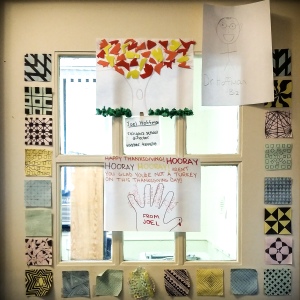Good Bye, Vassar Temple
Though I started working at Vassar Temple five years ago, I first heard about the place two years before that from my colleague and dear friend Rabbi Shoshana Hantman. “They’re a really nice group of people,” she was fond of saying about Vassar Temple.
With only a few exceptions, she was absolutely right.

Artistic gifts from students and teachers adorn my office door
And I say that having observed or consulted to hundreds of schools on five continents (soon to be six!). In fact, when I would tell my colleagues where I was working, the single most consistent response mirrored Rabbi Hantman’s remarks: “That’s a nice congregation,” frequently followed by a kind reference to Rabbi Arnold and Rabbi Golomb, and, most recently, Rabbi Berkowitz.
As I look back on five years, I certainly don’t want to minimize our technical accomplishments together. We built a thriving Hebrew school that draws members from neighboring congregations. We quadrupled the size of the post-bar/bat mitzvah Wednesday evening program. We grew the overall school by eight percent year over year when most religious schools are losing students.
Those feats, noteworthy in themselves, are also good for the financial heath of the congregation: good for the Jews and good for the bottom line, one might say. Or, as Rabbi Stuart Geller observes: the religious school is the financial engine that pulls the synagogue train.
So I don’t want to make light of bringing in new members or of increasing enrollment. But neither are these statistics the things that stand out most in my mind.
Rather, I remember non-tangible manifestations of a holy community.
For example, when our last Hebrew-school session of the year for grades 5-7 came to an end at 6:00pm on the Wednesday before Passover, the nearly 20 students in attendance refused to leave. Instead of bolting out of the school — as children so often do in other settings when class ends — they stayed behind, savoring a few final moments with each other and their Hebrew teachers. Surely this is what the Rabbis had in mind when they inserted the line into our morning liturgy, “make the words of your Torah sweet to us.”
When four Sunday-school teachers called in sick at the last minute last year, the remaining, healthy teachers jumped into action to run a constructive program together. One high school-aged teacher offered to teach a different class, improvising as she went. Another agreed to teach alone, though she had planned to work with a partner. And so on down the line. Though extreme, that day was hardly atypical, as teachers regularly volunteered to help each other out, never losing the smiles that came to symbolize our time together on Sunday mornings. What better way could there be to realize the Rabbis’ hope that we serve God together in joy?

Good-bye selfie
The list goes on: Sixth graders who eagerly anticipated their opportunity — though at least two years away — to teach in the school. Middle- and high-school students who insisted on starting each class with, “How was your week?” Grade-school students who were so proud of their work that they begged me to come into their classrooms for a closer look. Students who complained when I canceled class for snow that never arrived. Teachers who focused not just on what we were teaching but even more on who we were teaching.
In Pirkei Avot — “The Sayings of the Ancestors” from almost 2,000 years ago — Rabbi Shimon declares that the world is sustained by three things: Torah, service to God, and kindness. Later, still in the spirit of groups of three, he enumerates three crowns: the crown of monarchy, the crown of priesthood, and the crown of Torah. Then, having listed three, he adds a fourth, a crown that outweighs the other three: the crown of a good name.
More than a millennium later, Ovadiah ben Avraham of Bartenura wrote about this, suggesting that the crown of a good name refers specifically to a good reputation for doing good deeds.
Taken together, Ovadiah and Shimon tell us that being known for the right things is more important than royalty, more important than religious leadership, and even more important than Torah itself.
And this is what I will remember from my five years running the school at Vassar Temple: students, parents, teachers, leaders, and rabbis who in overwhelming majority are deservedly known for the way, through personal example, that they model the three things upon which the world stands: Torah, service to God, and great kindness.
Blessed is God, who crowns us with glory.
[An abridged version of this piece first appeared in the Vassar Temple June, 2016 bulletin.]



